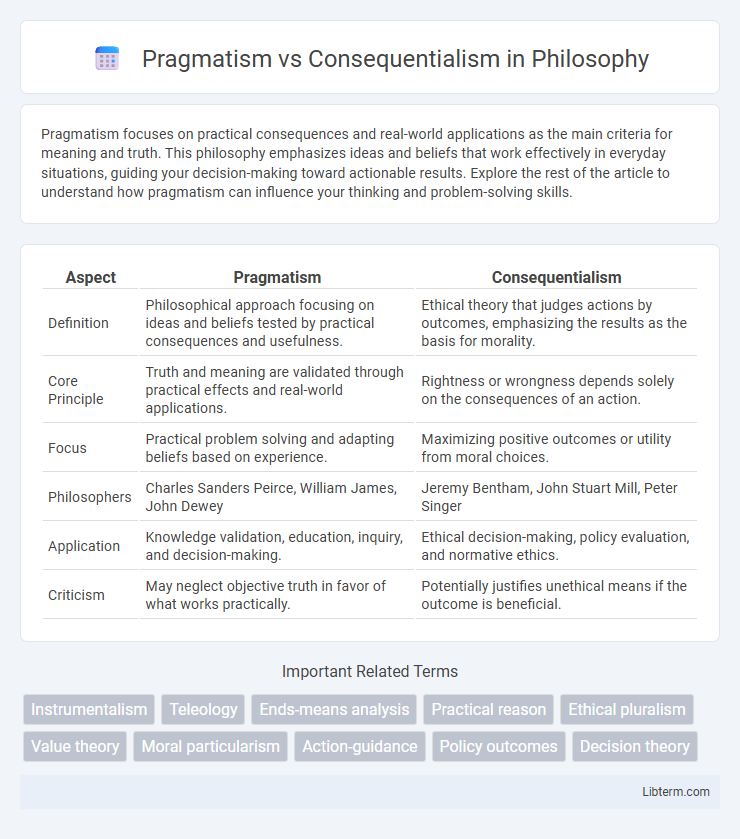Pragmatism focuses on practical consequences and real-world applications as the main criteria for meaning and truth. This philosophy emphasizes ideas and beliefs that work effectively in everyday situations, guiding your decision-making toward actionable results. Explore the rest of the article to understand how pragmatism can influence your thinking and problem-solving skills.
Table of Comparison
| Aspect | Pragmatism | Consequentialism |
|---|---|---|
| Definition | Philosophical approach focusing on ideas and beliefs tested by practical consequences and usefulness. | Ethical theory that judges actions by outcomes, emphasizing the results as the basis for morality. |
| Core Principle | Truth and meaning are validated through practical effects and real-world applications. | Rightness or wrongness depends solely on the consequences of an action. |
| Focus | Practical problem solving and adapting beliefs based on experience. | Maximizing positive outcomes or utility from moral choices. |
| Philosophers | Charles Sanders Peirce, William James, John Dewey | Jeremy Bentham, John Stuart Mill, Peter Singer |
| Application | Knowledge validation, education, inquiry, and decision-making. | Ethical decision-making, policy evaluation, and normative ethics. |
| Criticism | May neglect objective truth in favor of what works practically. | Potentially justifies unethical means if the outcome is beneficial. |
Introduction to Pragmatism and Consequentialism
Pragmatism emphasizes practical consequences and real-world applications as the core of truth and meaning, encouraging flexible problem-solving based on experience and outcomes. Consequentialism evaluates the morality of actions solely by their results, asserting that right actions maximize overall good or utility. Both philosophies prioritize outcomes but diverge in their approach, with pragmatism centered on usefulness and adaptability, while consequentialism focuses on ethical evaluation of consequences.
Defining Pragmatism: Key Principles
Pragmatism centers on practical consequences and real-world applications as the core criteria for truth and meaning, emphasizing that ideas must be tested through experience and action. It prioritizes adaptability, problem-solving, and the utility of beliefs over abstract principles, contrasting with Consequentialism's focus on outcomes to determine moral rightness. Key principles include the rejection of absolute truths, the emphasis on continuous inquiry, and the belief that knowledge evolves through interaction with the environment.
Understanding Consequentialism: Core Concepts
Consequentialism centers on the ethical principle that the morality of actions depends solely on their outcomes, emphasizing the maximization of overall good or utility. Key variants include utilitarianism, which seeks the greatest happiness for the greatest number, and ethical egoism, focusing on actions that benefit oneself. The framework evaluates decisions by predicting and comparing potential consequences, prioritizing results over intentions or inherent rules.
Historical Roots and Philosophical Foundations
Pragmatism originated in the late 19th century with philosophers like Charles Sanders Peirce and William James, emphasizing practical consequences and experiential verification as central to meaning and truth. Consequentialism, with roots tracing back to ancient thinkers like Epicurus and refined by Jeremy Bentham and John Stuart Mill, centers on the ethical principle that the morality of actions depends solely on their outcomes. Both philosophies prioritize results, but pragmatism focuses on truth and belief validation through practical effects, while consequentialism evaluates moral rightness based on the net benefits or harms produced.
Pragmatism vs Consequentialism: Main Differences
Pragmatism emphasizes practical consequences and real-world applications as the basis for truth and meaning, while consequentialism evaluates the morality of actions strictly by their outcomes or consequences. Unlike consequentialism, which focuses primarily on maximizing overall good, pragmatism allows for flexible criteria based on context, experience, and problem-solving effectiveness. Pragmatism values the usefulness of ideas in addressing specific situations, whereas consequentialism adheres to well-defined ethical principles aimed at achieving the best overall results.
Similarities Between Pragmatism and Consequentialism
Pragmatism and consequentialism both emphasize the practical outcomes of actions as central to evaluating their merit, prioritizing results over abstract principles. Each philosophy values adaptability and the consideration of real-world consequences in decision-making processes. Both frameworks reject rigid dogma, promoting flexible strategies that lead to beneficial, effective results.
Practical Applications in Ethical Decision-Making
Pragmatism emphasizes flexible ethical decision-making based on practical outcomes and the context of real-world situations, guiding individuals to adapt principles as conditions change. Consequentialism evaluates the morality of actions primarily through their outcomes, prioritizing decisions that maximize overall good or minimize harm regardless of established rules. In practice, pragmatism allows for iterative adjustments in ethics to fit evolving circumstances, while consequentialism provides a clear framework focused on the measurable results of actions in ethical dilemmas.
Criticisms and Challenges of Each Approach
Pragmatism faces criticism for its reliance on practical outcomes which can lead to subjective interpretation, potentially undermining consistent ethical standards. Consequentialism is challenged by its focus on outcomes alone, often disregarding moral intentions and the intrinsic value of actions, causing ethical dilemmas in situations where harmful means lead to beneficial ends. Both approaches grapple with balancing flexibility and moral consistency while addressing the complexities of real-world ethical decision-making.
Impact on Modern Philosophy and Society
Pragmatism, emphasizing practical consequences and utility in truth evaluation, profoundly shapes contemporary philosophical inquiry and social reforms by prioritizing experiential outcomes. Consequentialism centers on the ethical significance of actions' outcomes, influencing modern moral theory, policymaking, and justice systems through outcome-based evaluations. Both frameworks contribute to evolving dialogues on ethical decision-making and knowledge application, driving progress in fields such as law, education, and public policy.
Conclusion: Which Ethical Framework Prevails?
Pragmatism emphasizes practical consequences and flexible problem-solving, adapting ethical decisions to real-world contexts, while consequentialism strictly evaluates morality based on the outcomes' overall utility or harm. The ethical framework that prevails depends on the situational demands: pragmatism excels in complex, evolving scenarios requiring nuanced judgment, whereas consequentialism is stronger in consistent, outcome-focused assessments. Both frameworks contribute valuable perspectives, but the preference hinges on whether adaptability or outcome maximization is prioritized in ethical decision-making.
Pragmatism Infographic

 libterm.com
libterm.com